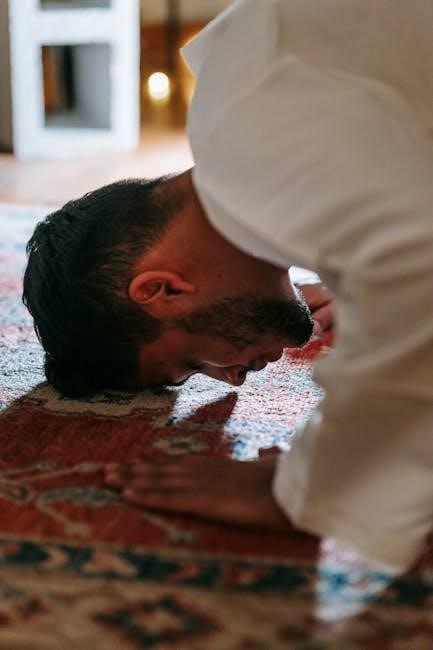Dua after Salah is a beautiful practice in Islam, allowing believers to connect with Allah, express gratitude, and seek forgiveness. It is a moment of reflection and spiritual growth, deeply rooted in Islamic tradition and recommended immediately after obligatory prayers. Reciting authentic duas enhances the spiritual experience and strengthens one’s bond with the Almighty.
Understanding the Importance of Dua Post-Prayer
Dua after Salah holds profound significance in Islam, serving as a means to connect with Allah, express gratitude, and seek forgiveness. It is a Sunnah practice, emphasizing the Prophet Muhammad’s (PBUH) consistent supplications following obligatory prayers. This moment is considered sacred, as the heart is most receptive to divine connection post-prayer. Dua after Salah is not merely a ritual but a heartfelt conversation with the Creator, fostering spiritual growth and humility. The Quran and Hadith highlight the merit of supplication, encouraging believers to seize this opportune time for their requests. By incorporating authentic duas, Muslims align with Islamic traditions, strengthening their faith and seeking Allah’s mercy and guidance in their lives.
The Significance of Dua After Salah
Dua after Salah is a sacred Sunnah practice, recommended immediately following obligatory prayers. It is a moment of divine connection, seeking forgiveness, and expressing gratitude to Allah, fostering spiritual growth and humility in believers.
Why Dua is Encouraged Immediately After Obligatory Prayers
Dua is encouraged immediately after obligatory prayers because it is a moment of heightened spirituality and divine proximity. The Prophet Muhammad (PBUH) often supplicated after Salah, emphasizing its significance. This practice is rooted in the belief that Allah is most responsive to supplications following acts of worship. The post-Salah period is considered a time of acceptance, where the heart is pure and the soul is receptive. Reciting duas then allows believers to seek forgiveness, express gratitude, and request guidance, aligning with the Sunnah and fostering a deeper connection with Allah. This cherished Islamic tradition enriches one’s faith and strengthens their relationship with the Almighty.
Authentic Duas to Recite After Each Fard Salah
Authentic duas after Salah include supplications like “Allahu Akbar” and “Subhanallah,” recommended in Hadiths. These prayers seek forgiveness, guidance, and Allah’s mercy, fostering spiritual growth and closeness to Him.

Duas Recommended for Fajr Prayer
Fajr, the dawn prayer, is a sacred time for supplication. Reciting specific duas after Fajr strengthens spiritual connection and seeks blessings. One recommended dua is: “Rabbighfir li, wahdini, wa afini, warzuqni” (O Lord, forgive me, guide me, grant me health, and provide for me). Another is: “Allahumma inni as’aluka ‘ilman naafi’an wa amalan mutaqabbalan” (O Allah, I ask for beneficial knowledge and accepted deeds); These supplications reflect the Prophet’s Sunnah and are ideal for starting the day with mindfulness and gratitude. They emphasize seeking Allah’s mercy, guidance, and sustenance, aligning with the spiritual significance of Fajr. Regular recitation fosters a deeper connection and sets a positive tone for the day ahead.
Duas Recommended for Dhuhr Prayer
Dhuhr, the midday prayer, is a time for seeking forgiveness and divine protection. After Dhuhr, it is recommended to recite: “Rabb ighfir li, wa tub ‘alayya, innaka antat-Tawwabur-Rahim” (O Lord, forgive me and turn in mercy to me; indeed, You are the Oft-Returning, the Merciful). Another supplication is: “Allahumma a’inni ala dhikrika wa shukrika wa husni ibadatika” (O Allah, assist me in remembering You, thanking You, and perfecting my worship). These duas reflect the Prophet’s teachings and are ideal for seeking blessings and protection during the bustling part of the day. Regular recitation fosters humility and gratitude, aligning with the spiritual essence of Dhuhr. They emphasize seeking Allah’s mercy and grace, making them a powerful addition to one’s prayer routine.
Duas Recommended for Asr Prayer
The Asr prayer marks the midpoint of the day, making it an ideal time for reflection and seeking divine guidance. After Asr, it is recommended to recite: “Allahumma bika amantu, wa laka aslamtu, wa bika khalaqtu, wa ilayka urajoo’, wa laka tubtu, wa laka uneebu, wa bika rahmatuka astaghithu. A’oodhu bika min sharri nafsee, wa min sharrish-shaytaan najee” (O Allah, in You I have believed, to You I have submitted, by You I was created, to You I will return, to You I repent, and to You I return in obedience. I seek Your mercy, and I take refuge in You from the evil of my soul and the evil of Shaytan). This supplication, along with the repetition of “Subhanallah”, “Alhamdulillah”, and “Allahu Akbar” (33 times each), is highly encouraged to seek Allah’s forgiveness and blessings. These duas, rooted in the Sunnah, emphasize humility and trust in Allah’s mercy, making them a perfect conclusion to the Asr prayer.
Duas Recommended for Maghrib Prayer
The Maghrib prayer, performed at sunset, is a time of transition and reflection. After completing the prayer, it is recommended to recite specific supplications to seek Allah’s forgiveness and protection. One of the most emphasized duas is: “Allahu Akbar, Allahu Akbar, Allahu Akbar, la ilaha illallahu, wallahu Akbar, Allahu Akbar, wa lillahil-hamd” (Allah is the Greatest, there is no deity except Allah, and to Allah belongs all praise). Additionally, reciting “Astagfirullah” (I seek forgiveness from Allah) 100 times is encouraged, as it cleanses the heart and seeks divine pardon. These supplications, rooted in the Sunnah, are particularly beneficial during Maghrib, as they offer spiritual solace and protection from evil. Reciting them consistently fosters a deeper connection with Allah and enhances the spiritual benefits of the prayer.
Duas Recommended for Isha Prayer
The Isha prayer, performed at night, is a time for deep reflection and seeking divine guidance. After completing the prayer, it is recommended to recite specific supplications to strengthen one’s faith and seek Allah’s mercy. One of the most emphasized duas is: “Allahumma inni as’aluka ’ilman naafi’an wa amalan mutaqabbalan wa rizqan waasi’an wa shifa’an min kulli da’in” (O Allah, I ask You for beneficial knowledge, accepted deeds, ample sustenance, and healing from every ailment). Additionally, reciting “Rabbighfir li, wa tub ’alayya, innaka antat-Tawwabur-Rahim” (O Lord, forgive me and accept my repentance, for You are the Oft-Returning, the Most Merciful) is highly encouraged. These supplications, rooted in the Sunnah, are particularly beneficial during Isha, as they offer spiritual solace and protection through the night. Consistently reciting them enhances the spiritual benefits of the prayer and strengthens one’s connection with Allah.

References from the Quran and Sunnah
The Quran and Sunnah emphasize the importance of dua after Salah. The Prophet Muhammad (PBUH) taught authentic supplications, such as seeking forgiveness and blessings, immediately after obligatory prayers.
Quranic Verses Supporting Post-Salah Supplication
- Surah Al-A’raf (7:55): “Call upon your Lord with humility and in secret.” This verse emphasizes the importance of humble supplication, which aligns with the practice of making dua after Salah.
- Surah Al-Shu’ara (26:118): “My Lord, I seek refuge with You from the prompting of the devils, and I seek refuge with You, my Lord, lest they be present with me.” This highlights seeking refuge and forgiveness post-Salah.
- Surah Al-‘Imran (3:38-39): Prophet Zakariyya’s dua while standing in prayer shows that supplication during and after Salah is a divine practice.
These verses underscore the significance of supplication and its proper etiquette, as taught in the Quran.
Hadiths Highlighting the Practice of the Prophet Muhammad (PBUH)
The Prophet Muhammad (PBUH) consistently practiced supplication after Salah, emphasizing its importance. Abu Umamah narrated that the Prophet (PBUH) taught that the most readily accepted supplication occurs after obligatory prayers. Another hadith in Sahih Muslim states, “Allah is the Greatest” should be recited 33 times, “I seek forgiveness from Allah” 33 times, and “There is no deity but Allah” once after each prayer. Additionally, the Prophet (PBUH) often raised his hands in supplication after Salah, especially during times of need. These practices, documented in authentic hadiths, demonstrate the Prophet’s consistent devotion to supplication after Salah, encouraging believers to follow his example.

Benefits and Rewards of Reciting Dua After Salah
Reciting dua after Salah offers numerous spiritual and worldly benefits. It strengthens one’s connection with Allah, fostering a deeper sense of humility and gratitude. The Prophet (PBUH) emphasized that supplications after Salah are eagerly accepted by Allah, making it a prime opportunity to seek forgiveness, guidance, and provision. Regularly practicing post-Salah supplications can expiate sins, elevate one’s spiritual rank, and grant divine protection. It also cultivates a sense of mindfulness and tranquility, helping believers navigate life’s challenges with faith and resilience. By adhering to this Sunnah, individuals not only gain spiritual rewards but also draw closer to Allah, experiencing a profound sense of inner peace and fulfillment.
